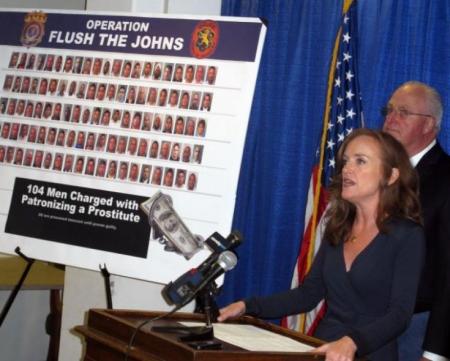据德国《世界报》6月4日报道,日前,纽约检察院出重拳扫黄,在网络上公布了104名嫖娼者的详细信息。这一举措不仅吓坏了涉案者,也令广大网民感到震惊。
卖淫嫖娼在美国大部分州都是违法的。纽约检察院的女检察官Kathleen Rice多年来一直致力于打击非法性交易,她利用各种手段追查非法妓院经营者、性交易中介机构和皮条客,并予以严惩。
现在瑞斯又将矛头指向了嫖客,其惩治方式和力度令人咋舌:在警方最近的一次秘密扫黄行动之后,瑞斯在网络上建立了“性交易耻辱柱”,将被警方抓获的104名嫖娼者的姓名、照片和住址公之于众,以达到震慑效果。被公布的涉案人员中有律师、有华尔街商人、也有医生,年龄最小的仅17岁,最大的已经79岁,大部分都有妻室。
瑞斯和她的扫黄团队先在网上发布虚假的卖淫广告来吸引“客户”,再假扮妓女去酒店房间赴约,并要求嫖客先支付50至100美元的预付金。当嫖客付款时,警察就会破门而入。这些落网的嫖娼者除了登上“耻辱柱”以外,还将面临一年以内监禁。
这种空前的扫黄方式在社会上引起了争议。一位被告的辩护律师Bruce Barket谴责这一举措“太夸张”,他认为公布照片是对涉案者极大的侮辱。“这些男人该怎么面对他们的妻子和孩子呢?”巴开特说。
但瑞斯坚持认为打击卖淫嫖娼必须不留情面。“这些人并不是受害者”,她说,“他们在进行性交易之前就应该清楚自己会受到惩罚”。
在美国,除了内达华州之外的其他地区都禁止性交易。从2008年到2012年,纽约警方共抓获5834名嫖娼者,其中大部分被处以罚款。“耻辱柱”是目前为止最严厉的处罚措施。
# An odious, unjust prostitution sting
It is hard to imagine a bigger waste of law enforcement resources than “Operation Flush the Johns,” the month-long sting that resulted in 104 arrests announced by Nassau County District Attorney Kathleen Rice on Monday.
These men, whose names and photos Rice eagerly disseminated, were arrested because of what they allegedly said to undercover cops they arranged to meet after seeing their “escort” services advertised on Backpage.com.
What’s at issue, in other words, is a trumped-up version of a phony crime. If anyone committed a real crime here, it was the cops, who lured these poor horny bastards to a hotel room under false pretenses, only to lead them away in handcuffs.
The offense with which the Nassau 104 were charged - which carries a penalty of up to a year in jail, along with the ritual humiliation Rice already has meted out — is patronizing a prostitute in the third degree.
Think about that for a minute. There is no such thing as patronizing a pornographer in the third degree, patronizing a liquor dealer in the third degree or patronizing a race track in the third degree. That is because New York’s legislators have decided to allow these consensual transactions, even though moralists take a dim view of them, while prohibiting the voluntary exchange of sex for money.
That dictate entails some pretty arbitrary distinctions. If two people meet through an online ad, one buys the other a nice dinner and they have sex afterward, they have committed no crime. But if two people meet through an online ad and have sex, after which one of them hands the other $100 so she can buy herself a nice dinner, they may both be subject to arrest, depending on the exact content of their precoitus conversation.
Those are not the sort of details on which criminal liability should hinge, because they do not involve the violation of anyone’s rights.
Rice defends punishing these men for words they allegedly said to fake prostitutes by arguing that she is thereby protecting real prostitutes from risk.
“Sex workers are often vulnerable victims of traffickers and pimps,” she said in a press release on Monday. “Yet they too often remain the prime targets in prostitution investigations while the johns who fuel the exploitation are treated as mere witnesses. My office and the police department are turning the tables on the illogical and immoral nature of that equation.”
Talk about illogical and immoral. The prostitution ban that Rice enthusiastically enforces makes sex workers vulnerable to abuse by traffickers, pimps and customers because it drives their trade underground, where the assistance of the legal system is hard to come by.
Indeed, as Rice herself notes, prohibition makes sex workers vulnerable to abuse by the police and courts as well. In this lawless environment, important distinctions - between adults and minors, between employees and slaves — are apt to be disregarded.
Similar problems can be observed whenever the government bans a widely demanded product or service. The black markets created by such edicts are dangerous places characterized by fraud and violence, in contrast with the honesty and peace that tend to prevail in legal versions of those very same markets. Contrast the prostitution business in New York and in Nevada, or the booze business before and after December 1933.
Like alcohol prohibition, drug prohibition creates hazardous conditions for buyers and sellers alike. But while our criminal justice system tends to come down harder on drug dealers than on drug users, with the former perceived as preying on the latter, law enforcement officials like Rice argue that in the case of prostitution, those roles are reversed: The buyer is the villain, while the seller is the victim. What anti-prostitution crusaders do not see or refuse to acknowledge is the role they play in creating the victims they claim to be saving.
Read more: http://www.nydailynews.com/opinion/odious-unjust-prostitution-sting-arti...
on charges of soliciting a prostitute

